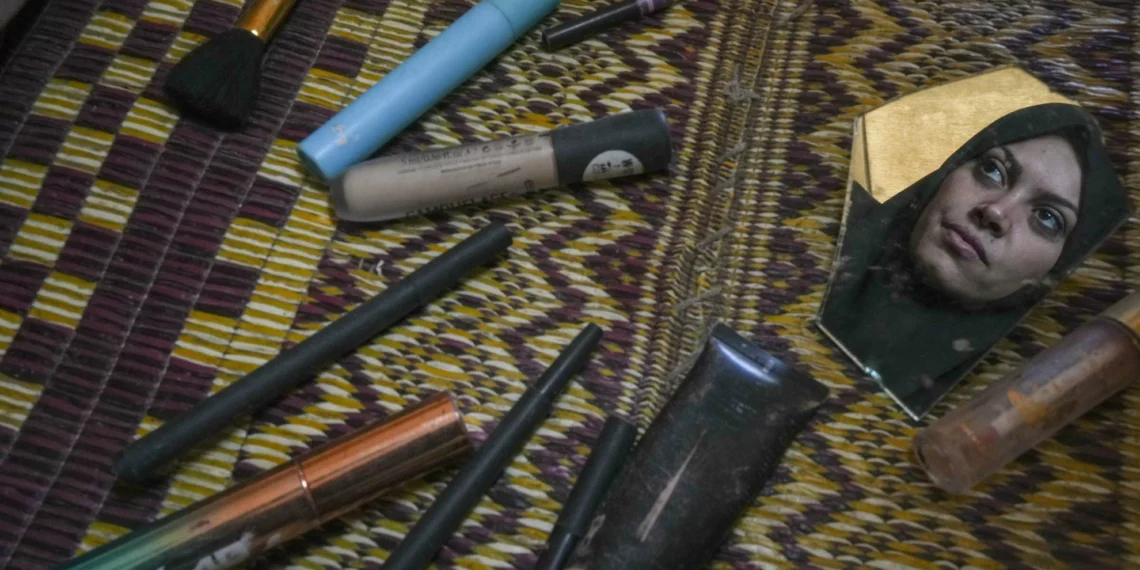In Gaza’s overcrowded tent camps, women are facing an additional challenge that is often overlooked – maintaining modesty and privacy while living in cramped and crowded conditions. These women, who have already been displaced from their homes due to conflict and violence, are now forced to share living spaces with extended family members and live just steps away from their neighbors. This lack of privacy and personal space not only affects their physical well-being but also their emotional and mental health.
The Gaza Strip, a small territory located on the eastern coast of the Mediterranean Sea, has been a site of conflict and violence for many years. With a population of over two million people, it is one of the most densely populated areas in the world. The ongoing Israeli-Palestinian conflict has resulted in many families being displaced from their homes and seeking refuge in tent camps. These camps, set up by aid organizations, provide temporary shelter for the displaced families. However, the conditions in these camps are far from ideal, especially for women.
One of the biggest challenges that women in these camps face is the lack of privacy. With multiple families living in close quarters, it is difficult for women to find a space where they can have some alone time. They are forced to share living spaces, including kitchens and bathrooms, with extended family members, making it nearly impossible to have any privacy. This can be particularly challenging for women who have to adhere to cultural and religious norms of modesty. It is not uncommon for women to feel uncomfortable and exposed in such situations, leading to a sense of vulnerability and insecurity.
Living in such crowded conditions also means that women have to be extra cautious about their actions and words. Any conversation or activity can easily be overheard by their neighbors or family members. This constant surveillance can be suffocating for women, who are used to having their own personal space and freedom. It can also lead to conflicts and misunderstandings between families, as privacy and personal boundaries are not respected.
Moreover, the lack of privacy also poses a threat to women’s safety. In such densely populated areas, there is a higher risk of sexual harassment and violence against women. With no private spaces to retreat to, women are constantly exposed to the risk of being harassed or abused. This fear of violence and harassment can have a significant impact on women’s mental and emotional well-being, making them feel trapped and powerless.
Apart from the lack of privacy, women also face the challenge of maintaining modesty in these camps. Many families have to share one tent, with no partition or division between the living spaces. This means that women have to change, bathe, and use the toilet in front of their family members, including male relatives. This can be extremely uncomfortable and embarrassing for women, who are expected to maintain modesty at all times. It also poses a challenge for women during their menstrual cycle, as they have to manage their hygiene and privacy in such cramped conditions.
Living in such overcrowded and cramped conditions can also have a significant impact on women’s physical health. The lack of proper ventilation and sanitation facilities can lead to the spread of diseases and illnesses. Women, who are responsible for taking care of their families, have to constantly worry about the health and hygiene of their loved ones. This added pressure can be overwhelming, especially in already difficult circumstances.
Despite these challenges, women in Gaza’s tent camps are resilient and resourceful. They have found ways to adapt and cope with their living conditions. Many women have formed support networks and have come together to support each other. They have also found ways to create some semblance of privacy, such as using curtains or sheets to create partitions in their living spaces. Some women have also started small businesses within the camps, allowing them to have a sense of independence and empowerment.
The international community must also recognize the unique challenges faced by women in Gaza’s tent camps and take concrete steps to address them. Aid organizations must work towards providing better living conditions for these families, including separate living spaces for women and their families. There should also be efforts to educate and raise awareness about women’s rights and the importance of privacy and modesty in these communities. Women must be given a voice and included in decision-making processes that affect their lives.
In conclusion, the women living in Gaza’s overcrowded tent camps face a multitude of challenges, including the added hardship of maintaining modesty and privacy. It is crucial for the international community to recognize and address these challenges and work towards providing better living conditions for these women







